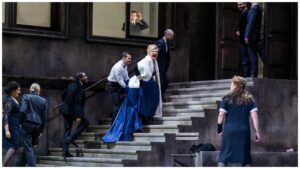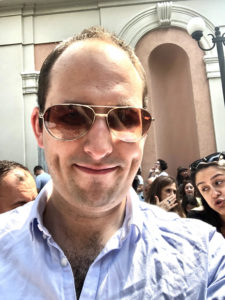
Royal Opera House 2023-24 Review: Elektra
Antonio Pappano energizes Christof Loy’s New production, Despite Uneven Singing from Nina Stemme
By Benjamin Poore(Photo credit: © ROH 2024/Tristram Kenton)
Had a family bust-up over the holidays? Don’t worry – it could be worse. Richard Strauss’ “Elektra,” with a libretto by Hugo von Hofmannsthal from his 1903 play of the same, took a dysfunctional family of the opera stage to new extremes, boiling up Sophocles’ tale of matricide in the Freudian pressure cooker of Secessionist Vienna.
Christof Loy’s new production of the 1909 piece for the Royal Opera House succeeds that of Charles Edwards, which last appeared over a decade ago. It was originally slated for 2020 but postponed for all the obvious reasons. Thomas Beecham conducted the UK debut of “Elektra” in the same theater in 1910, along with Strauss, who gave two performances. His modernism fiercely divided audiences and critics – it found a champion in George Bernard Shaw – though the anticipation meant it was a huge sell out nonetheless.
The End of an Era
Similarly anticipated in 2024, it is the last new production to be conducted by outgoing Music Director Antonio Pappano and the first time he has tackled the score, previously using its extravagance – 110 instrumentalists spilling out of the pit into the side boxes – to tempt conductors of stature to the house, e.g. Andris Nelsons and Semyon Bychkov. Musically it is the high watermark of Strauss’ adventure into modernism, marshaling an intensely motivic expressionist language, an extreme use of vast orchestral forces, and elements of a chromatic bitonality that teeter on the narrow precipice of traditional harmony, just as in 1905’s “Salome.”
Unleashing both chromaticism and sexuality in tandem seemed to terrify Strauss, who reverted to the poised elegy of “Der Rosenkavalier” and the perky neoclassicism of “Ariadne auf Naxos” in subsequent years. Loy’s production, designed by Johannes Leiacker and lighting designer Olaf Winter, places the action in Strauss’ own era, and indeed city where he was director of the opera for several years. It is built around the entrance to a palatial building that resembles the Wiener Staatsoper, or one the other grand late imperial structures of the Ringstrasse, albeit a grubby side entrance where the Maids gather to gossip and the staff hang out around the litter against walls stained with soot.
The interior is partly visible through long sash windows. This is where Klytaemnestra’s desperate, forgetful partying unfolds, and dinner-jacketed actors brutalize the women for their amusement; shades, perhaps, of Pasolini’s “Salò.” The interior lights flick on and off to signal comings and goings, and changes of dramatic gear. As the cathartic murder comes to pass, we move into the realm of ritual with a single flaming torch carried by Chrysothemis in a ballgown. The primal urges bubble underneath the bourgeois trappings.
It’s a container for the piece’s terrors, rather than an amplifier, and a little on the safe side for a work that is decidedly unsafe. Loy’s direction, though, is as meticulously psychological as ever, and sharply-attuned to the agonies and neuroses of the three key women, with plenty of sharp dramatic gestures: Klytaemnestra’s use of her luxurious fur scarf is especially apt; Elektra herself is jerky and unpredictable, like the famous accounts of hysterics from neurologist Charcot’s Paris hospital.
The spare setting, perhaps a little too restrained for an opera of nearly two hours in one space, does give the psychic orchestral eruptions of the orchestra that is endlessly responsive to the tangled image-rich text, room to register. Elektra is driven consumed by hatred, with an incestuous yearning for her sister Chrysothemis, conversely more motivated by love. In Loy’s reading, the score’s full-throated lyricism is the passionate counterweight to its abrasive, experimental impulses, though at the piece’s climax as Elektra dances herself to oblivion, feels like the manifestation of an oceanic excess of feeling. In Elektra, love and hate are indistinguishable and inextinguishable.
Star Appearances
The Royal Opera House assembled a veteran cast. Soprano Sara Jakubiak has made a name internationally for her Chrysothemis and was resplendent on opening night. Her voice had precisely the right gleam to differentiate her from Nina Stemme’s more weathered, umber take on the title role, but never wanted for power or richness, cutting across the orchestra with remarkable ease.
She excelled in the long, sustained lines that make the opera indulgent as well as bracing, with sculpted phrasing and nimble changes of color and weight. She had a voice that teemed with life and hope compared to her gloomy sister.
Further glamor came from Karita Mattila as Klytaemnestra; she sang Chrysothemis at Covent Garden back in the 1990s, alongside the great Hildegard Behrens. Though her voice has less heft than in previous years, it is still finely-calibrated for intense musical and dramatic expression, especially when adjoined to her jerky, outsized mannerisms, stylized and expressionist.
Her great monologue showcased a remarkable box of vocal tricks: a suddenly straight tone, nasal and keening; regal fulsomeness in moments of self-aggrandizement; chrome shrieking in her moments of fury and despair; a wonderfully ghostly lower register for her portentous premonitions of violence.
Elektra Herself
And Stemme herself? A more mixed picture, though not one without many of the hallmarks of her renown in this repertoire. It wasn’t her best night, to be frank, gesturing to her throat at the nonetheless rapturous curtain call. She knew as well as the rest of us. There were many noticeable cracks, with the voice under considerable strain as the piece went on. At some moments it nearly gave up on her altogether, and the knock-on effect on phrasing – stilted and choppy – and high notes was undeniable. One should add the caveat that she was also performing with an injured wrist.
The role is punishing enough as it is – both marathon and sprint – but it is testament to Stemme’s professionalism and acting chops that she nonetheless carried it off with considerable power. When the voice was there, it was as fine as ever, retaining a raw, rugged power that is the perfect conduit for this atavistic drama; her background as a mezzo has always given an intensity and grain to her middle register, which crackled with life during the many intense sequences of narration and monologue. Her climactic “Agamemnon!”, as Orest strikes the fatal blows, was nonetheless monumental. Sudden turns into moments of exquisite softness were equally remarkable.
The five Maids, including Noa Beinart, Veena Akama-Makia, Gabrielė Kupšytė, Ella Taylor, Valentina Puskás, cackled and snarled, bringing plenty of vocal and dramatic definition to their nameless, numbered cohort. Łukasz Goliński made for a charismatic, smooth Orest, coldly dedicated to his task and perhaps a little one-dimensional on Loy’s vision. Vocally a great success though, bar some slippery pitching, showcasing a baritone that combines brassy sheen with murky, mysterious depths. Charles Workman sang Ägisth with an oily ease that belied Strauss’ reputation for unwieldy and unforgiving tenor writing before he got what he deserved.
Victory Lap
Pappano will surely be delighted with the orchestra’s performance in this latest segment of his victory lap at Covent Garden. Brisk and lithe, my watch said curtain down after probably just over an hour and forty minutes, perhaps a touch less. It teemed with life, with the many extraordinary details of Strauss’ score pointed and clarified, the many motifs etched in the texture with utmost care. The vast woodwind forces were especially pungent, from the bass clarinet that seeps from the very first titanic chord of the piece to the wailing oboes, hecklephone (!) and clarinet.
There is no doubt that his new job up the road as chief conductor at the London Symphony Orchestra has informed the symphonic sweep of this score in his hands; the lullaby-like theme for strings that culminates in the manic waltz of the climax glistened with luxurious sensuality, only a step away from Puccini. Perhaps the production doesn’t live up to Pappano’s musicianship, but there is much that impresses.



